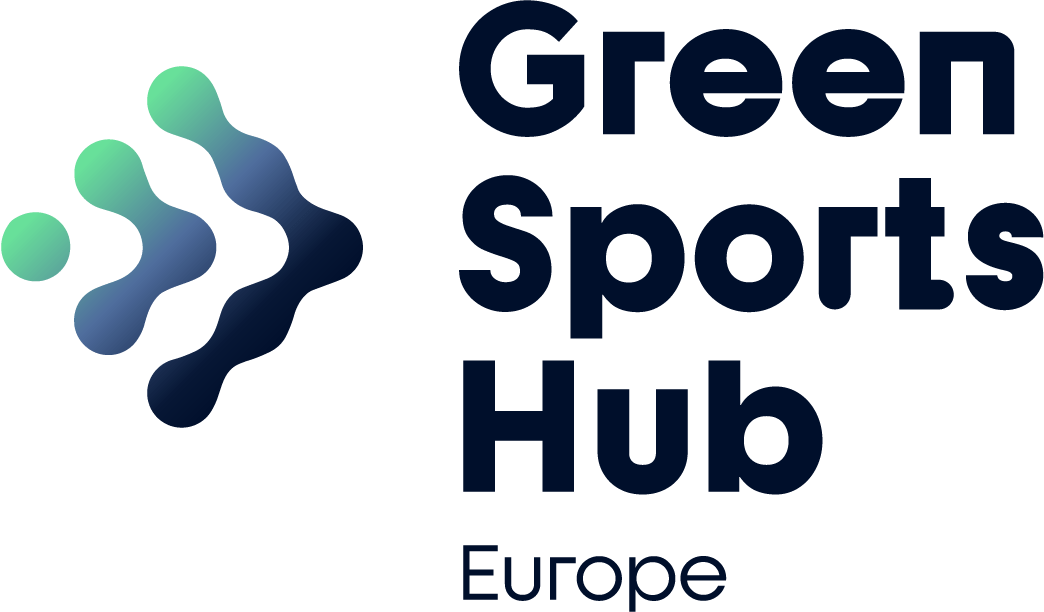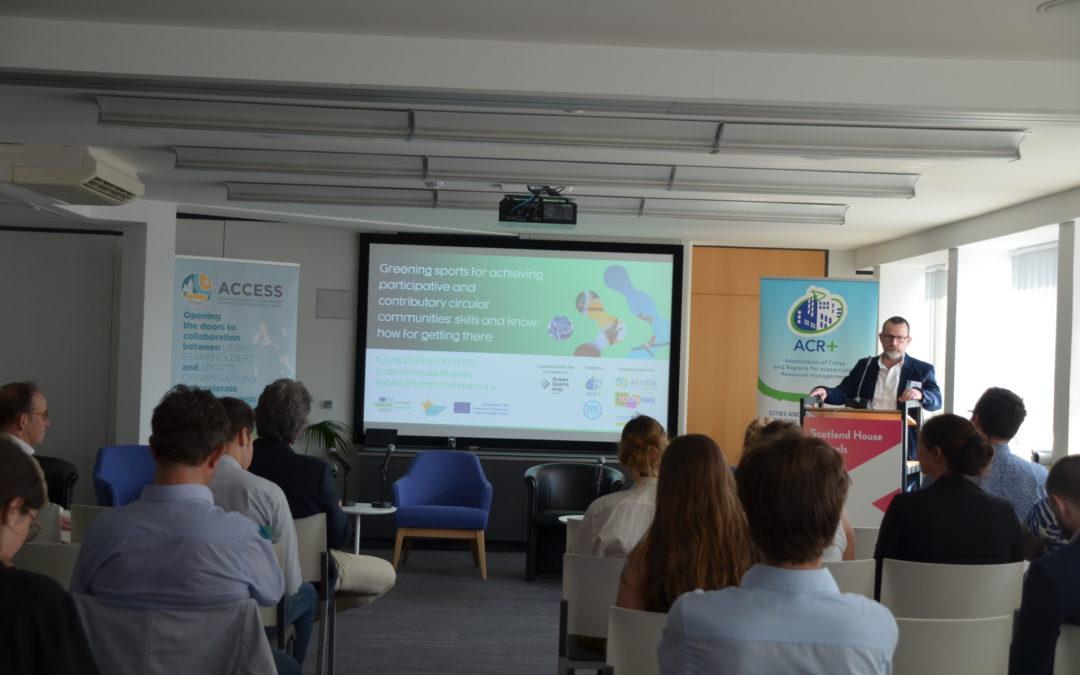As the project is entering its final months, the EU Green Week served as a perfect opportunity and occasion for Green Sports Hub to look back at the previously published tools, results and general observations and share them with a diverse audience of 50.
Organised by ACR+, supported by Zero Waste Scotland and titled “Greening sports for achieving participative and contributory circular communities: skills and know-how for getting there”, the event was labelled as an official EU Green Week partner event and wanted to reflect on this year’s key focus of the Week: skills for sustainable, resilient and socially fair communities. In fact, the only such event in the field of sports.
Considering the Green Sports Hub’s journey so far – the activities that revolved around screening and assessing the existing and necessary skills for supporting the transition towards environmental sustainability in sports and developing appropriate and tailor-made learning modules and capacity-building material, the event successfully covered all the key observations, outputs and outlooks for future. The four hours long conference gathered a diverse audience of 50 participants, including academia, media, public authorities, sports organisations, EU officials and NGOs which allowed interactive discussions, looking at the challenges and solutions from various perspectives.
The event also had a secondary objective to exploit and highlight synergies and cooperation with like-minded projects and initiatives across Europe. With the participation and intervention of several projects, as well as those of other sports entities, NGOs, academia and public authorities like Zero Waste Scotland, BG Be Active, Royale Union Saint-Gilloise, Brussels-based Solvay Business School, the event highlighted the need for cross-sectoral cooperation in order to achieve an integrated, systemic and systematic progress in the field of environmental management in sports.
During his opening speech, Iain Gulland, Zero Waste Scotland’s founding CEO and president of ACR+, reflected on the General Assembly ACR+ had the previous week and said:
“Cooperation and network approach has been the heart of ACR+’s principles since it was founded nearly 30 years ago. Our General Assembly in Dublin showed how important citizen engagement and the responsibility of various stakeholders are to contribute to circular cities. How can this happen and how is this reflected in our daily lives is what we need to further explore”.
Peter Fischer of the European Commission’s DG Education and Culture and policy officer for the green sport portfolio followed up on the previous speech of Iain Gulland explaining and reassuring the audience that the work of the EU’s Expert Group on Green Sport was advancing and, in fact, that the long-awaited “Recommendations for a common framework for sustainable sport” should be published towards the end of summer 2023. These recommendations would help the Member States in setting up and implementing appropriate frameworks for tackling some of the critical challenges covered by the document, such as sustainable infrastructure, innovative cross-sectoral solutions, and further capacity building and education, all accompanied by examples of good practices. Adeline Plé of the Surfrider Foundation Europe closed the keynote speeches with her intervention “In what ways do cities have the power to accompany the transition of the sports sector?”.
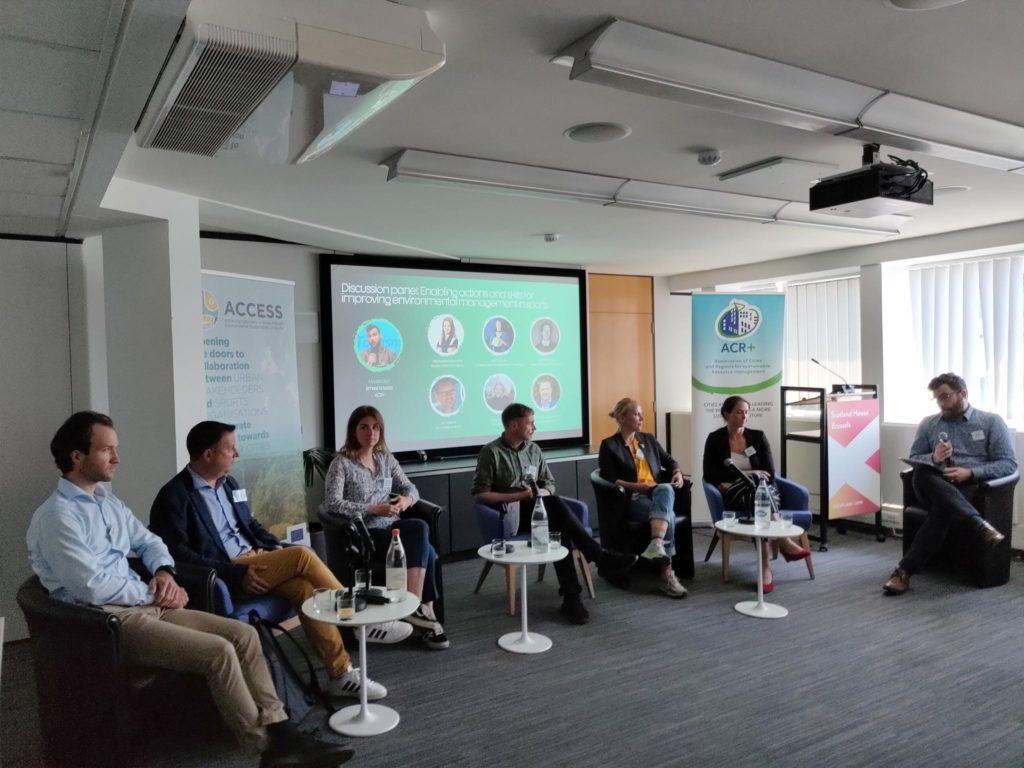
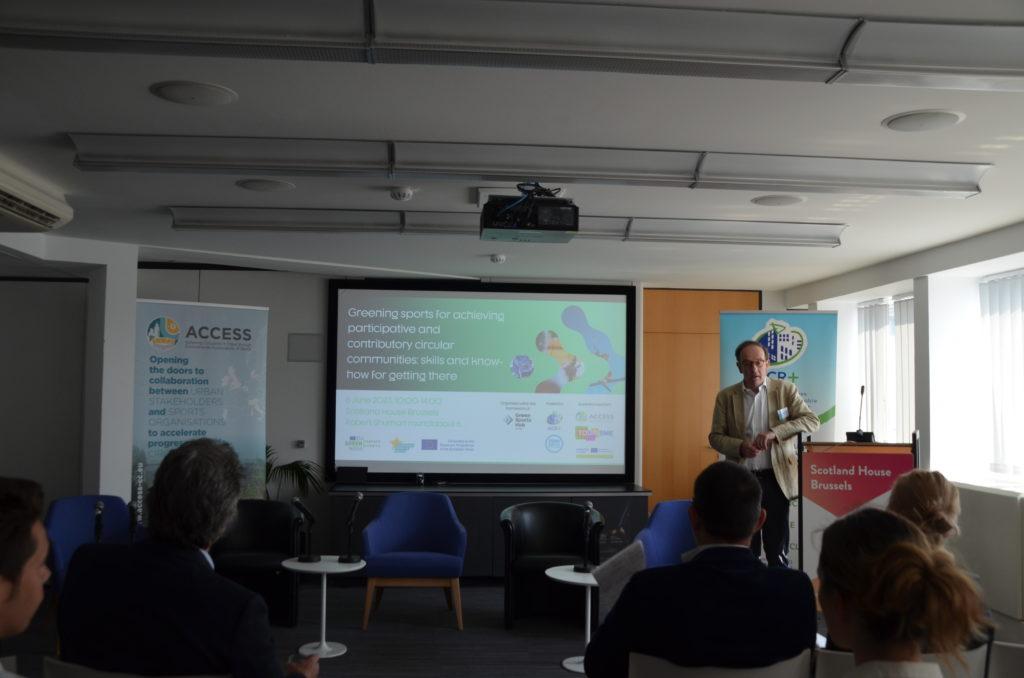
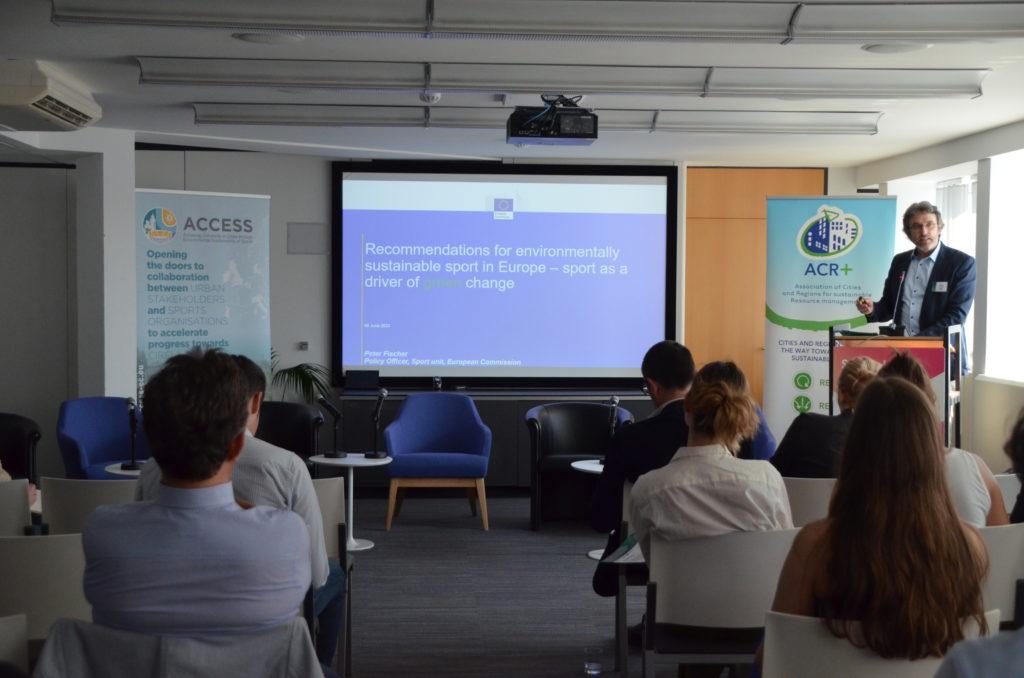
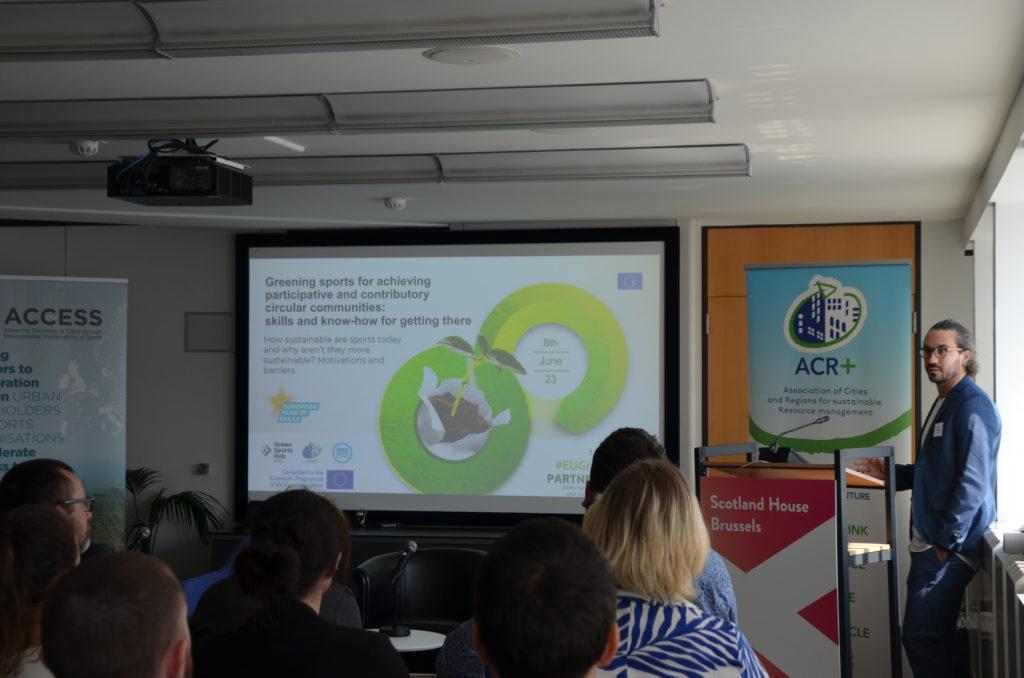
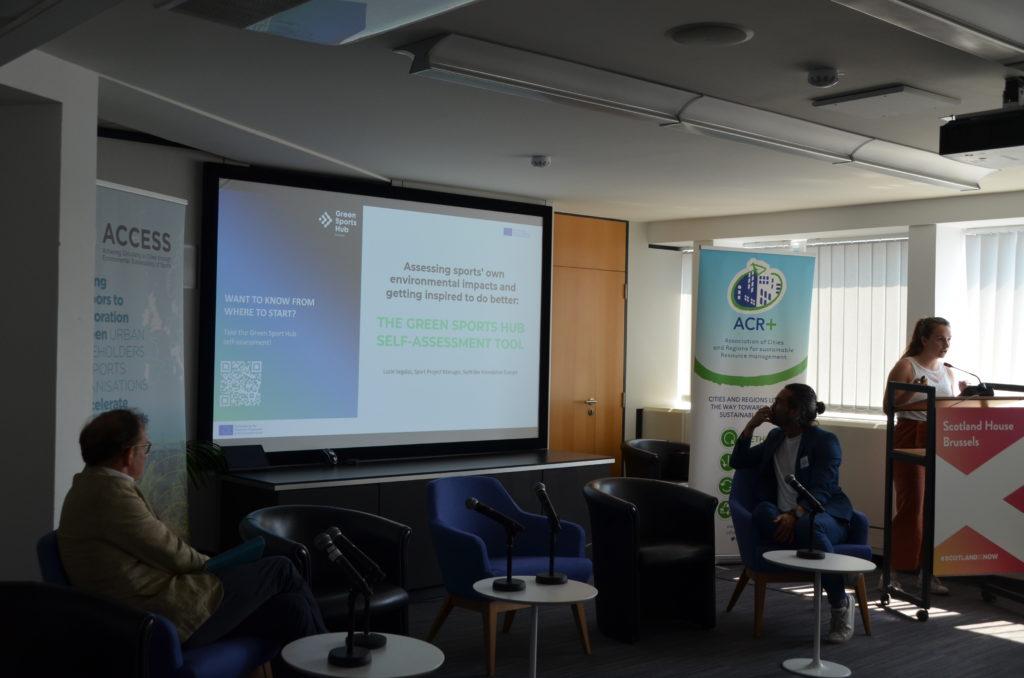
Green Sports Hub, itself, had special attention given to some of the project’s key outputs and findings, including the mapping of existing initiatives, tools and standards, results of the survey on sustainability in European sports, leisure and fitness organisations, as well as the project’s most valuable one – the self-assessment tool for sports organisation to track their progress in transitioning towards more environmentally sustainable practices. ACR+ contributed to this slot and set of presentations on tools, findings and observations with its own portfolio composed of previous and current projects such as those on environmental management in tourism – TOURISME (funded by COSME), MINEV (INTERREG) or in sport TACKLE (funded by LIFE) and ACCESS (funded by Erasmus+), among others.
The panel discussion composed of diverse panellists allowed the entire room to participate in an inspiring discussion which saw skills, tools, practices, challenges and solutions being discussed, as well as potentials for increased cooperation, peer-to-peer support and learning and the role of formal education and relevant institutions in providing appropriate skills. The panel included Raphaelle Moeremans of Royale Union Saint-Gilloise, Katrina Reuter of Confédération Européenne de Volleyball, Jonas Orset, Founder of Green Cycling Nordic Norway, Zero Waste Scotland’s Warren McIntyre, a Bulgarian activist and managing director of BG Be Active – Laska Nenova and Bruno Van Pottelsberghe, the Dean of Solvay Business School.
What concerns future outlooks, Gregor Grbec of the Slovenian National Olympic Committee and David Baird-Smith of Rugby Europe reflected on policy recommendations for both public authorities and sports organisations which would help and give these initiatives an appropriate framework and how can sport organisations join their forces for creating a critical mass.
Finally, Eva Rebmann, the acting Deputy Director at the European Olympic Committee EU Office, looked back at the event with the following words as her final key remark:
“Sports must change and not only for image or marketing reasons – our societies suffer from climate change and sports have the power to change mindsets and current processes. We see that tools, platforms, learning modules, communication materials, support and much more is available and await out there, we all as a community need to make the best out of them”.
Want to know more? Get access to all presentations used during the event.
